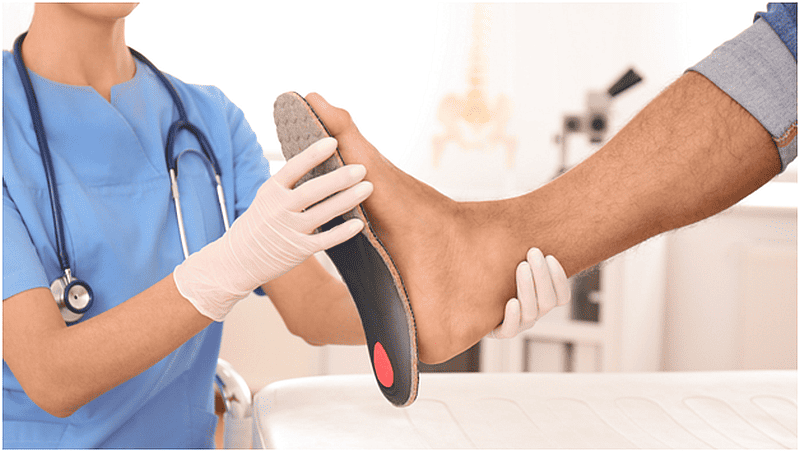When it comes to foot health, the right support can make all the difference. Whether you’re dealing with foot pain, recovering from an injury, or simply looking to enhance your comfort, insoles are a crucial solution. But with so many options available, how do you choose between custom insoles and over-the-counter (OTC) insoles? In this blog post, we’ll explore the key differences between these two types of insoles, their benefits, and how to decide which one is right for you.
Understanding Insoles: What Are They and Why Do You Need Them?
Insoles, also known as orthotics, are inserts placed inside your shoes to provide additional support, cushioning, and alignment correction. They can help alleviate a variety of foot-related issues, including:
- Plantar fasciitis
- Flat feet
- High arches
- Heel pain
- Overpronation or supination
- Foot fatigue
Insoles can also improve overall comfort, especially if you spend long hours on your feet or engage in high-impact activities like running or hiking.
Custom Insoles: Tailored Support for Your Unique Feet
Custom insoles are designed specifically for your feet based on a detailed assessment by a healthcare professional, such as a podiatrist. These insoles are crafted to address your unique foot structure, gait, and any specific issues you may be experiencing.
Benefits of Custom Insoles
- Personalized Fit: Custom insoles are made to match the exact contours of your feet, providing support where you need it most.
- Effective for Complex Issues: If you have severe foot problems, such as significant arch deformities or chronic pain, custom insoles can offer targeted relief.
- Durability: Custom insoles are often made from high-quality materials, making them more durable and long-lasting compared to OTC insoles.
- Corrective Support: Custom insoles can correct biomechanical issues, helping to improve your posture, gait, and overall foot health.
Drawbacks of Custom Insoles
- Cost: Custom insoles are more expensive, typically ranging from $200 to $800, depending on the complexity and materials used.
- Time-Consuming: Getting custom insoles involves an initial consultation, foot assessment, and sometimes multiple fittings, which can take several weeks.
- Limited Accessibility: Custom insoles require a prescription and a visit to a healthcare professional, making them less accessible than OTC options.
Over-the-Counter Insoles: Convenient and Affordable Relief
Over-the-counter insoles are readily available at pharmacies, sporting goods stores, and online. These insoles come in various sizes, shapes, and materials to suit different foot types and needs.
Benefits of Over-the-Counter Insoles
- Affordability: OTC insoles are significantly cheaper than custom options, with prices ranging from $10 to $100.
- Convenience: You can purchase OTC insoles without a prescription, making them easily accessible for immediate relief.
- Variety: OTC insoles are available in different styles, such as gel, foam, or rigid support, allowing you to choose based on your specific comfort and support needs.
- Quick Solution: If you need immediate relief from foot discomfort, OTC insoles are a quick and effective option.
Drawbacks of Over-the-Counter Insoles
- Generic Fit: OTC insoles are designed to fit a broad range of foot types, which means they may not provide the precise support needed for your unique foot structure.
- Limited Effectiveness: For those with severe or complex foot issues, OTC insoles may not offer sufficient relief or correction.
- Shorter Lifespan: OTC insoles may wear out more quickly than custom insoles, requiring more frequent replacement.
How to Decide Which Insoles Are Right for You
Choosing between custom and over-the-counter insoles depends on several factors, including your foot health, budget, and personal preferences. Here’s a breakdown to help you make an informed decision:
Consider Custom Insoles If:
- You have chronic foot pain or a diagnosed foot condition, such as plantar fasciitis, flat feet, or high arches.
- You’ve tried OTC insoles but haven’t found sufficient relief.
- You’re willing to invest in a long-term solution for better foot health.
- You require corrective support for biomechanical issues, such as overpronation or supination.
Consider Over-the-Counter Insoles If:
- You experience mild to moderate foot discomfort or fatigue.
- You’re looking for a budget-friendly option.
- You need immediate relief and don’t want to wait for custom insoles to be made.
- You have relatively normal foot structure and don’t require specialized support.
Both custom and over-the-counter insoles have their advantages and can play a vital role in enhancing your foot health and comfort. If you’re dealing with significant foot issues, custom insoles may be worth the investment for their personalized support and long-term benefits. However, if you need a quick, affordable solution for minor discomfort, over-the-counter insoles could be the right choice.
No matter which option you choose, it’s essential to listen to your body and consult with a healthcare professional if you’re unsure about the best insoles for your needs. Proper foot support can prevent pain, improve your posture, and keep you on your feet longer, so don’t underestimate the impact of the right insoles on your overall well-being.

